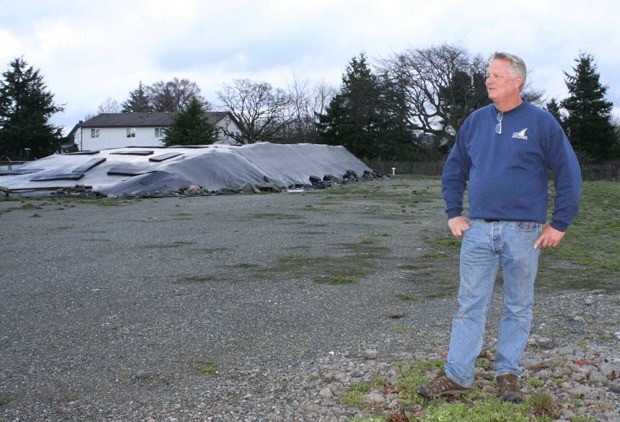The City of Oak Harbor and three contractors reached a tentative settlement with the Swinomish Indian Tribal Community over the desecration of Native American burial grounds during the 2011 Pioneer Way construction project.
Under the proposal, the city’s insurance provider will pay $1.2 million and the insurance companies for the three companies will pay a total of $800,000 to the tribe.
In addition, the city would turn over the deed to the old city shop property to the tribe for a future cemetery, according to City Administrator Larry Cort.
The terms of the settlement are still preliminary, Cort emphasized, explaining that the City Council and the tribal leaders must approve the deal. The council members will discuss the proposal during an executive session set for Tuesday.
Nevertheless, Mayor Scott Dudley said he is pleased with the proposal, noting that the tribe previously offered to settle for $3.9 million and the old city shop property.
“I think it’s the best possible outcome we could have hoped for based on what we know,” he said.
The city already spent an estimated $3.5 million on archaeology and other costs associated with the unearthing of the ancient burial grounds, according to City Engineer Joe Stowell. Dirt from the project was hauled to several different locations and given out as “free dirt” to residents; archaeologists had to sift through the many piles.
Dudley said he remains critical of the previous city administration for pushing the project to convert the downtown section of Pioneer Way to a one-way road.
City leaders either ignored or overlooked an advisory from the Washington State Department of Archaeology and Historic Preservation about the likelihood of cultural remains in the area as well as a recommendation to hire an archaeologist.
“Obviously, hiring an archaeologist would have saved us a lot of time, money and, most importantly, headaches,” Dudley said.
“These were human remains that didn’t have to be disturbed,” he added.
Dudley explained that the Swinomish Tribe wants the old city shop property to rebury the remains and artifacts unearthered during the project; he said the Tribe want the remains to be interred as close as possible to the original burial grounds.
The two-acre property is located at the top of Southeast City Beach Street. Assessed value is more than $600,000, according to the Island County Assessor’s website.
Under the settlement proposal, the tribe will cover the costs of reburial.
Archaeologists recovered more than 4,300 human bones or bone fragments, nearly 17,000 non-human bone fragments and more than 44,000 “pre-contact or historic artifacts or artifact fragments,” according to a declaration by M. Brian Cladoosby, chairman of the Swinomish Indian Tribal Community.
Cort explained that all the involved parties in the lawsuit met in a second mediation session at a Seattle law firm Wednesday for a 12-hour session. In addition to the city, the tribe filed suit against Strider, KBA and Perteet, the three contractors involved in the project.
An attorney for the Washington Cities Insurance Authority represented the city.
Cort said he doesn’t know if the large settlement will affect the city’s insurance rates. He said the rates are reassessed each year so city leaders will have to wait and see.



